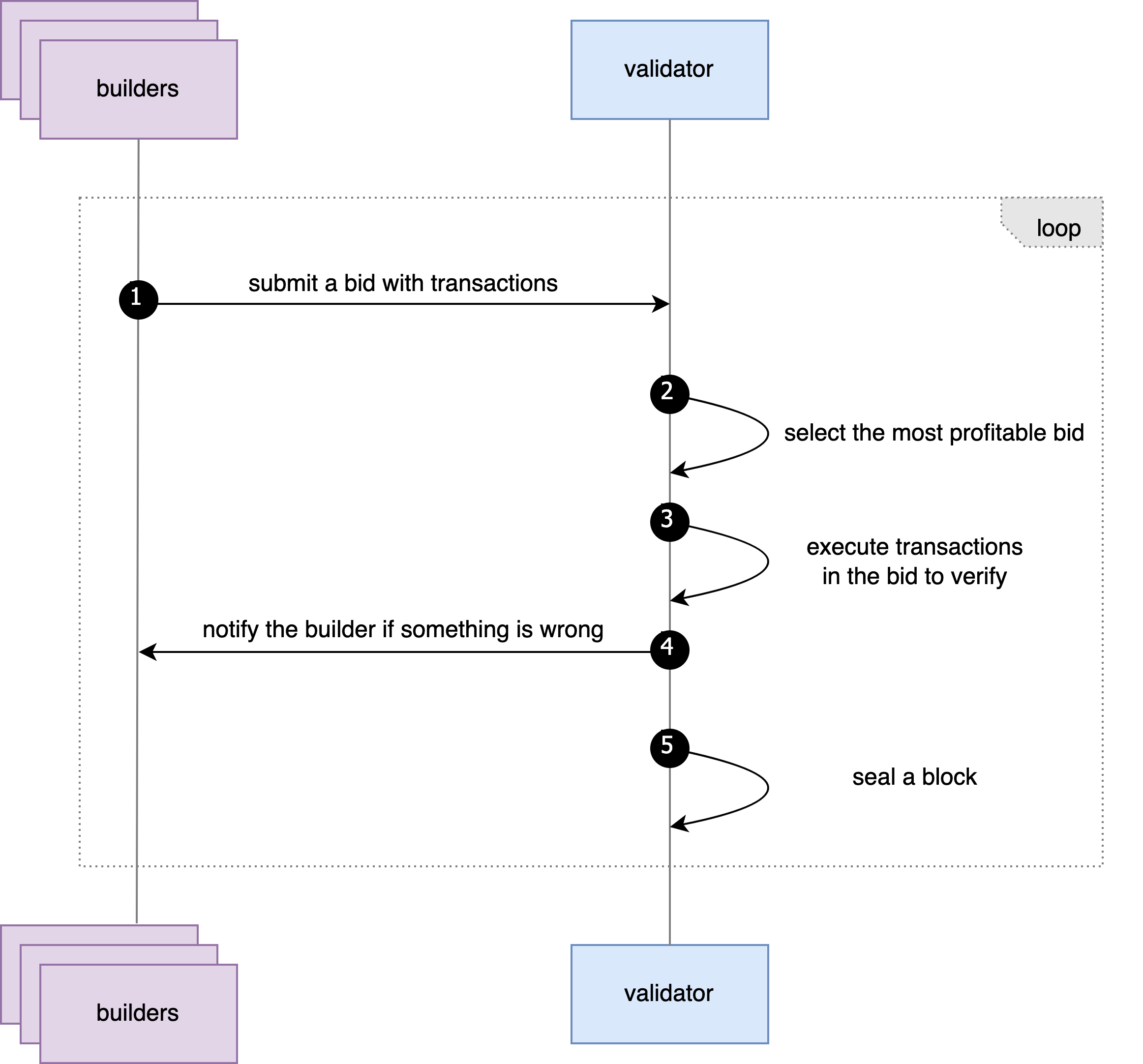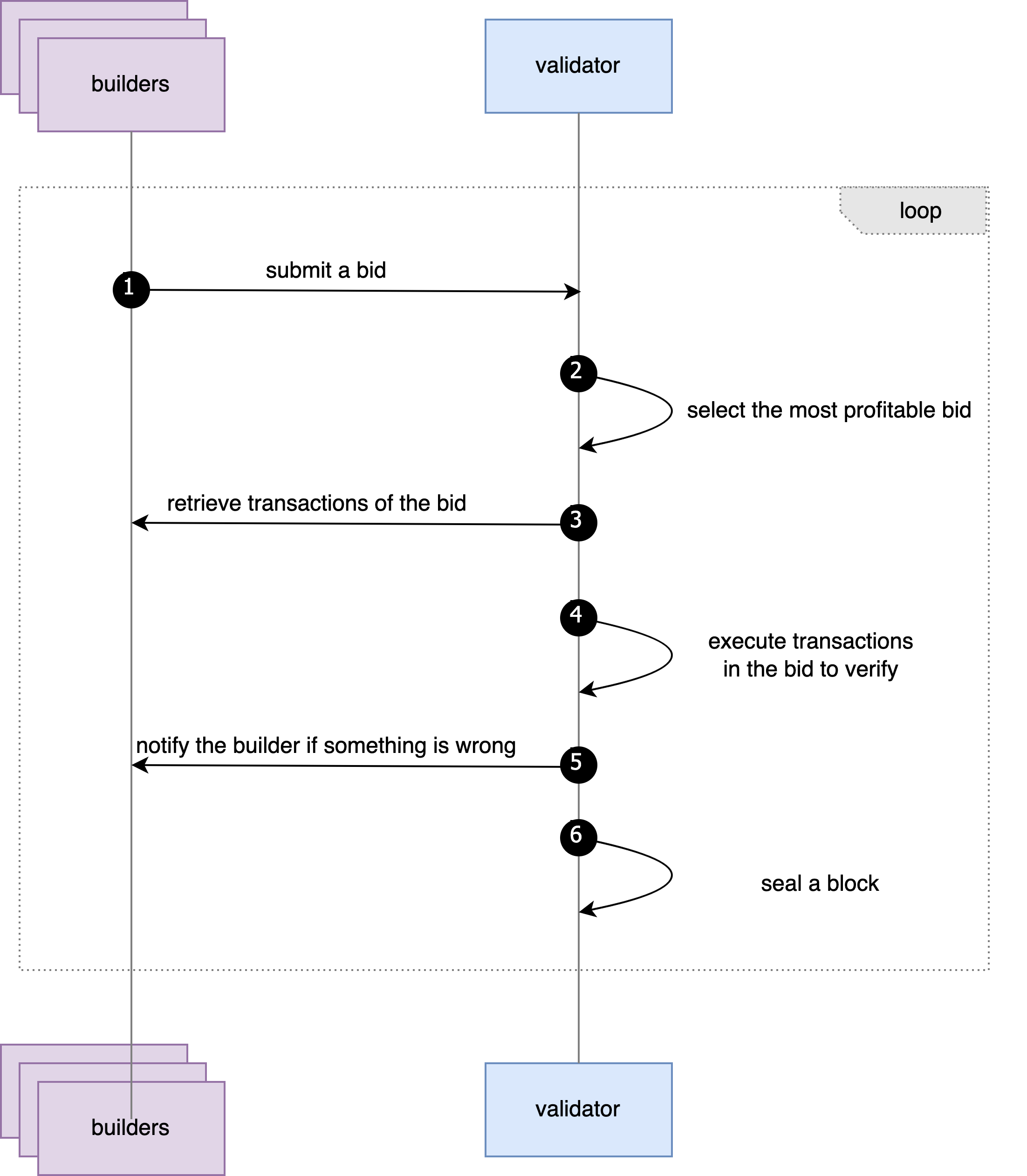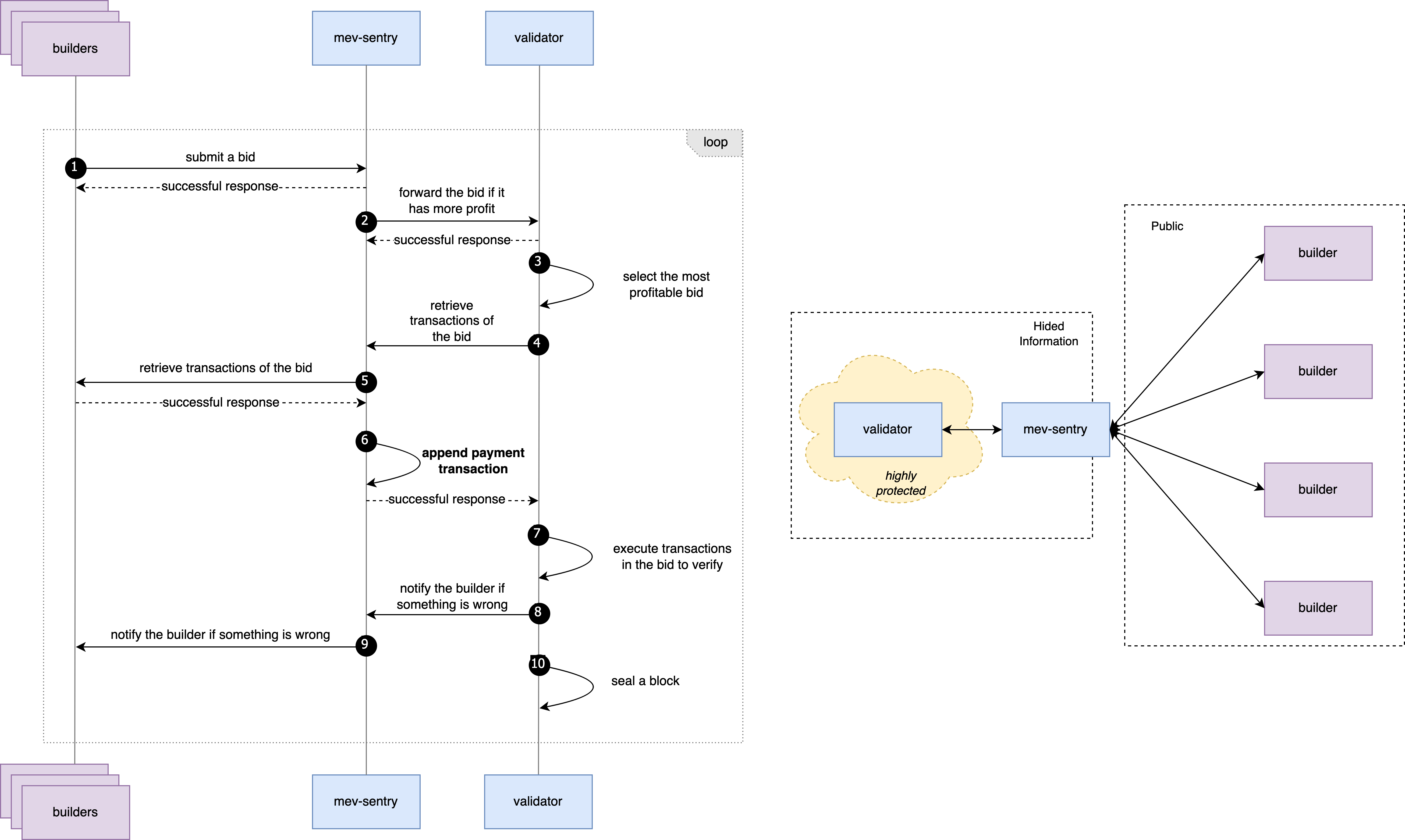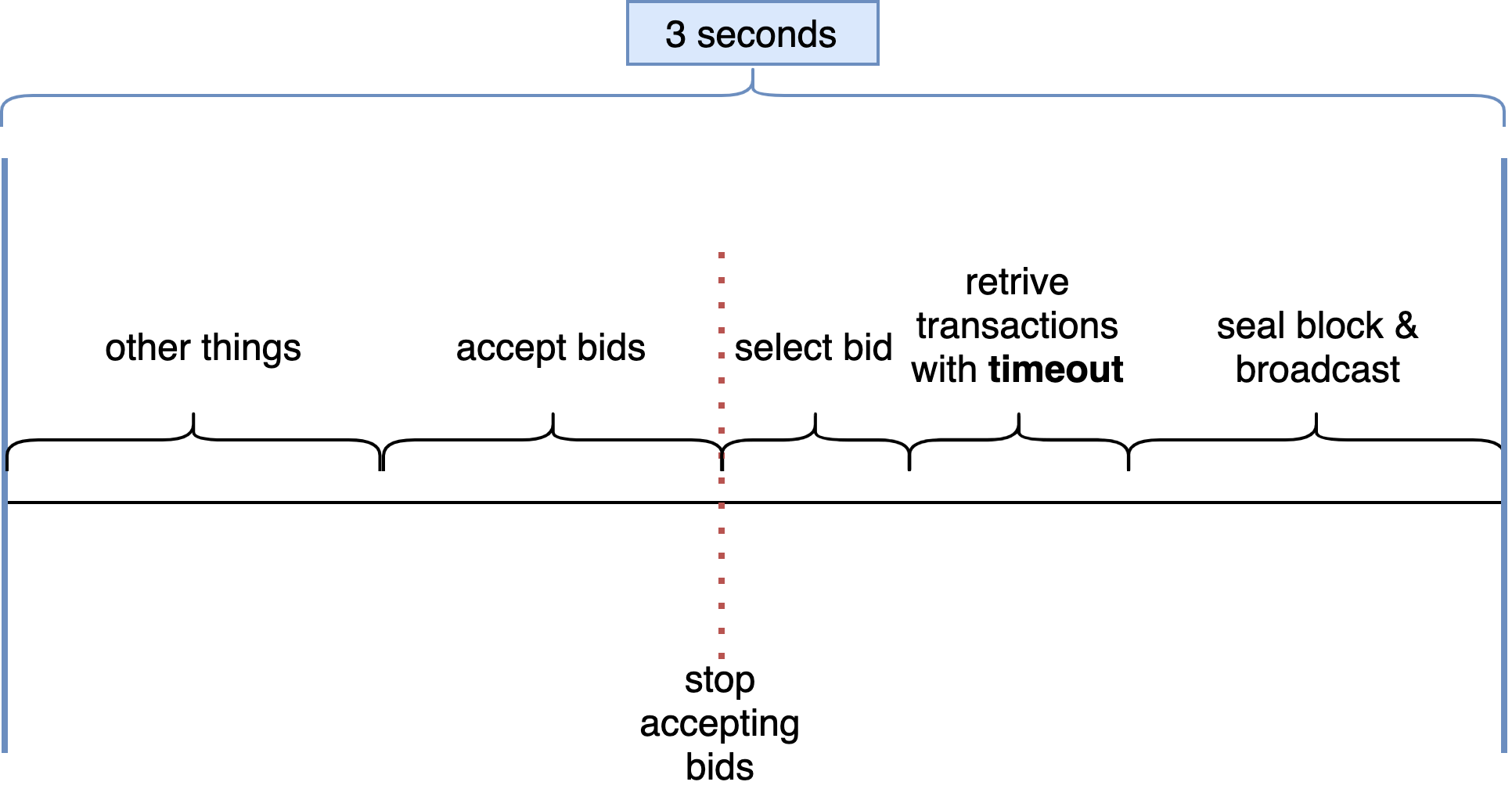-
Notifications
You must be signed in to change notification settings - Fork 518
New issue
Have a question about this project? Sign up for a free GitHub account to open an issue and contact its maintainers and the community.
By clicking “Sign up for GitHub”, you agree to our terms of service and privacy statement. We’ll occasionally send you account related emails.
Already on GitHub? Sign in to your account
BEP-322: Builder API Specification for BNB Smart Chain #322
Conversation
cc9d75b
to
58c701a
Compare
58c701a
to
3102c53
Compare
|
Regarding 3.1 Trust Model Regarding 3.2.1 Overall Workflow Regarding 3.2.2 Edge Cases Regarding 3.3 Payment & Economic Regarding 3.4 APIs |
e6f4c1e
to
3026162
Compare
83a5b6b
to
e77961e
Compare
d8725f1
to
afa99ea
Compare
afa99ea
to
8c251c1
Compare
|
@48ClubIan Some thinking about your points. Thanks. Make sense. Proxy is not much touched in the spec, however we can put a proxy in front of a validator in implementation to against ddos. This is updated in the latest draft BEP. Both 2 round and 1 round interactions are supported. For one round interaction, a builder can send transactions and bid information together. There are several considerations 1) no benefit for a builder to do something wrong, 2) if a validator finds a builder doing something wrong, it can refuse the builder. For the latest draft, a validator will create a smart contract for a builder to register. The implementation is not defined in the spec. A validator can ask his builder for a deposit if needed. Two points about this 1) builder can help validator produce more profitable blocks 2) validator selects bids with the highest block - which means a builder needs to reduce its builder fee for competitiveness 3) builder fee can be zero in this spec. Fixed. For registration, currently there could be a smart contract to provide transparency. The implementation is not restricted in the draft BEP. |
4cbcd48
to
d3d0cc4
Compare
|
Is it allowed to query the maximum bid of the current block? You can know the real-time bid of the current block on ETH, allowing real-time competition between builders.
|
| @@ -281,8 +331,11 @@ Response: | |||
| ```json | |||
There was a problem hiding this comment.
Choose a reason for hiding this comment
The reason will be displayed to describe this comment to others. Learn more.
I mean example of both normal and error response.
There was a problem hiding this comment.
Choose a reason for hiding this comment
The reason will be displayed to describe this comment to others. Learn more.
added
|
Good day how do I pull the request. Sorry I am new to this
Sent from Yahoo Mail for iPhone
On Friday, February 23, 2024, 6:55 AM, Raina ***@***.***> wrote:
@irrun commented on this pull request.
In BEPs/BEP322.md:
@@ -281,8 +331,11 @@ Response:
```json
added
—
Reply to this email directly, view it on GitHub, or unsubscribe.
You are receiving this because you are subscribed to this thread.Message ID: ***@***.***>
|
BEP: 322 Title: Builder API Specification for BNB Smart Chain Status: Draft Type: Standards Created: 2023-11-15 |
|
Is this in production already or being tested by some validators like BNB48, Avengers, etc? |




BEP-322: Builder API Specification for BNB Smart Chain
1. Summary
This BEP introduces a suite of interaction processes and API specifications to establish a fairer and more transparent
MEV framework on the BNB Smart Chain. Participants can follow this specification to collaborate on building and
proposing blocks.
2. Motivation
The Ethereum MEV market is thriving, with
the Ethereum Builder API Specification widely supported by
mainstream consensus clients. As of October 2023, the inclusion rate of blocks from builders is
approximately 90%.
The BNB Smart Chain MEV market still remains at a Wild West stage. The absence of PBS adoption results in a chaotic
landscape with different architectures and API standards. Nowadays, it is very challenging for validators to
to integrate with multiple MEV providers. Moreover, the absence of native support from the BSC clients
further exacerbates the instability of MEV services. To tackle these issues, this BEP proposes compliant guidelines and
standards with the following aims:
Improve Stability: Unified specifications for both validators and MEV providers to enhance integration and
stabilize the market.
Improve Economy: A unified architectural specification increases speculators' costs, fostering a healthy market
competition. Validators can extract more value by integrating with multiple MEV providers, which benefits delegators
as well.
Improve Transparency: This specification aims to bring transparency to the BSC MEV market, exposing profit
distribution among stakeholders to the public.
3. Background
Before diving into the specification, let's analyze the BSC trust model and its distinctive consensus protocol.
3.1 BSC Trust Model
Validators in the BNB Smart Chain are considered more trustworthy, as it requires substantial BNB delegation and must
maintain a high reputation. This stands in contrast to Ethereum, where becoming an Ethereum validator is much easier.
As of the end of 2023, there were approximately 40 validators on BSC (with more expected to join) and a total of
20 million BNB staked. In Ethereum, the barrier to becoming a validator is very low (i.e., 32 ETH), leading to over
800,000 Ethereum validators according
to Nasdaq.
Meanwhile, in the Ethereum PBS architecture, the 'relay' role is expected to be trusted by both builders and validators.
However, in BSC, validator misbehavior results in reputation damage and un-delegations, reducing the need for
introducing
another trusted role. In this specification, we eliminate the 'relay' role. However, this adjustment should not
compromise
the security and trust model for the MEV market between builders and validators.
3.2 BSC Consensus
In Ethereum, a block header is transferred from a builder to a validator for signing, allowing the block to be
broadcasted
to the network without disclosing the transactions to the validator. In contrast, in BSC, creating a valid block header
requires executing transactions and system contract calls (such as transferring reward and depositing to the validator
set contract), making it impossible for builders to propose the whole block.
4 Workflow
4.1 Definition
Builder: the party that specializes in the construction of BSC execution payloads using transactions received from
searchers and p2p network (trusted by searchers and users for fair inclusion).
Proposer: the party that signs and submits a block to the network, referred to as the validator.
Mev-sentry: the party that runs in front of a validator to proxy requests and enhance network security.
Bid: used by a builder to do competitive bidding for a block space. A bid should include the following
information:
4.2 One-Round Interaction (default)
Builders and validators collaborate to propose blocks during each block production interval. Two interaction options
exist
between them: one-round and two-round. With one-round, builders include transactions with their bids, allowing
validators
to immediately seal a block without additional transaction retrieves. One-round is the default option for trusted
relationship.
bid).
detailed errors to the builder. The validator may blacklist the builder for some time or forever if the builder
offers invalid bid.
In practical settings, opting for a One-round with MEV-Sentry (optional) configuration stands out as the optimal
solution
for ensuring both security and efficient payment processes. Subsequently, we will delve into the specific role that
MEV-Sentry can fulfill in the upcoming section.
4.3 Two-Round Interaction (optional)
Two-round interaction involves builders sending bids without transactions initially. If selected, validators retrieve
transactions through another RPC call before sealing the block. The two-round process is considered more time-consuming
compared to the one-round interaction. It's suggested to adopt two-round interaction for builders who do not fully
trust validator and are not concerned about the additional latency caused by one extra round of communication.
its signature as a receipt. The builder should return the full list of transactions.
bid).
errors to the builder. The validator may blacklist the builder for some time or forever if the builder offers invalid
transactions.
There are some edge cases should be elaborated:
If there is no profitable bid compared to local work, the validator should use locally mined block.
In two-round interaction, if the validator cannot receive the full list of transactions before timeout, the
validator should use the locally mined block too, and 1) notify the builder using issue report API; 2) blacklist
the builder for a while or even forever.
If a builder finds that its transactions are stolen by a validator, the builder should 1) refuse to send bids
to the validator, 2) disclose the steal to public channels for social influences if necessary.
Two-Round with MEV-Sentry(optional) interaction:
A MEV-Sentry can be used for validators to provide several functionalities. The sentry has its own wallet,
which should be different from the validator's consensus wallet, and append a transfer transaction to send builder fee.
It can also filter bids and only forward the more profitable ones to a validator. Meanwhile, a validator needs to
interact with many builders at the same time, sentry helps to hide the validator’s real IP
information and protect against DDoS and other threats. Therefore, it is highly suggested for validators to run such a
layer in front of itself in production.
After introducing the overall interactions, we would like to highlight some main differences between Ethereum
Builder Specification here for the readers who are familiar with it.
As mentioned in the background, the BSC trust model and consensus are different from Ethereum, it is justifiable for
builders to
send transactions to validators after receiving the receipt signature. In case a builder finds a validator stealing
transactions, it can 1) not submit bids to evil validators anymore, 2) reveal evidence to the public channels
(e.g., Discords, Github, blogs) for social influence.
In Ethereum, the fee settlement between builders and validators is conducted using the 'coinbase' reward (for reward
to
builders)
and token transfer (for the fee to validators). In BSC, the coinbase reward will be transferred to the system contract
for
later distribution to all delegators. A different way is proposed in this proposal, a validator can run an MEV-Sentry
to append a transfer transaction for payment. It will be further discussed in the later section.
4.4 APIs
The following APIs are introduced on Builder and BSC client sides, to implement the aforementioned workflows.
The full specification of these APIs are defined
in a repo with swagger and smart contracts.
4.4.1 Builder APIs
The following APIs should be implemented on Builder.
4.4.1.1 Retrieve Transactions
This api is used by the validator to ask for full transactions once a builder's bid is chosen. The request body will be
treated as a receipt for payment settlement.
Request:
{ "jsonrpc": "2.0", "method": "mev_retrieveTransactions", "params": [ { "bid": { "block": "the block number", "parentHash": "the hash of the parent block", "gasFee": "the total gas fee of the bid", "gasUsed": "the total gas used of the bid", "builderFee": "the fee that the builder would like to take from the validator" }, "signature": "the signature of the bid" } ], "id": 1 }Response:
{ "jsonrpc": "2.0", "result": { "bid": { "block": "the block number", "parentHash": "the hash of the parent block", "gasFee": "the total gas fee of the bid", "gasUsed": "the total gas used of the bid", "builderFee": "the fee that the builder would like to take from the validator", "txs": [ "the transactions in the bid" ] }, "signature": "the signature of the bid" }, "id": 1 }4.4.1.2 Issues Report
This API is used to report issues to a builder. For example, if a validator finds that a builder's transactions are
invalid or the transaction API is timeout-ed, a validator can notify the builder.
Request:
{ "jsonrpc": "2.0", "method": "mev_reportIssue", "params": [ { "validator": "validator address", "bidHash": "hash of the bid", "error": { "code": -38001, "message": "response message" } } ], "id": 1 }Response:
{ "jsonrpc": "2.0", "result": null, "id": 1 }4.4.2 Validator APIs
The following APIs should be implemented on the validator side or BSC clients.
4.4.2.1 Bid Block
This API is used by the builder to submit its bid for the current block production. In general, a proposer will use the
gas_feeandbuilder_fee_value(profit = gas_fee * validator_commission_rate - builder_fee_value) to find the mostprofitable bid.
Request:
{ "jsonrpc": "2.0", "method": "mev_sendBid", "params": [ { "bid": { "block_number": 123456, "parent_hash": "the hash of the parent block", "txs": [ "the transactions in the bid" ], "gasUsed": 100, "gasFee": 100000000000, "builderFee": 100000000000 }, "signature": "the signature of the bid" } ], "id": 64 }Response:
{ "jsonrpc": "2.0", "id": 64, "result": "the hash of the bid" }error example:
{ "jsonrpc": "2.0", "id": 64, "error": { "code": -38005, "message": "the validator is not in-turn to propose currently, try again later" } }5. Further Discussion
5.1 Implementation Consideration
With a shorter block time of 3 seconds in BSC compared to Ethereum's 12 seconds, designing for time efficiency becomes
crucial. Validators must set a cut-off time to stop receiving new bids, and a timeout to retrieve transactions from
the winning builder. To be more flexible, validators can choose to run a node with or without support for builders,
so a switch should be considered to turn on/off the feature based on its choice.
5.2 Payment & Economic Considerations
On the BNB Smart Chain, the block reward will be transferred to a system contract by consensus engine and distributed to
delegators and validators based on the staked amount every day. This distribution mechanism is also applicable to MEV
income. Without changing bsc consensus rule, the following approaches can be taken for payment
or the payment from users to builders,both off-chain and on-chain solutions can be considered:
Users can subscribe to builders' service. For example, users can pay builder service every month based on different
levels of prices.
Users can insert a transfer transaction into his/her bundles to pay the builder.
For the payment between builders and validators:
A validator can run a proxy and append transfer transactions to pay builders. If a validator does not append the
transfer transaction, a builder can still use the receipt (with the validator’s signature) to ask for settlement using
other approaches.
A validator and a builder can negotiate other off-chain and on-chain approaches that are out of the scope of the
specification.
Furthermore, let's also discuss what will happen if a builder or a validator misbehaves.
If a builder wins a bid and does not return the full list of transactions to a validator, the validator can easily
detect this
and stop service for the builder. Eventually, the builder will get no income from block production and users
will also leave the builder.
If a validator steals transactions from a builder when there is potential value. The victim builder can detect this.
It can stop sending bids to the validator and post evidence (i.e., the signature from a validator) about the
misbehavior. The validator will lose the income from the builder and even more builders.
5.3 Builder Registration
The process for builders to register to validators is not defined in this specification. However, a promising solution
is highlighted and suggested–using a smart contract for builder registration.
In BSC, one smart contract can be implemented to provide the following functionalities:
With this kind of smart contract, builders and validators can discover each other easily. It also provides transparency
for all related stakeholders. An example is presented to demonstrate such a smart contract.
6. References
7. License
The content is licensed under
CC0.